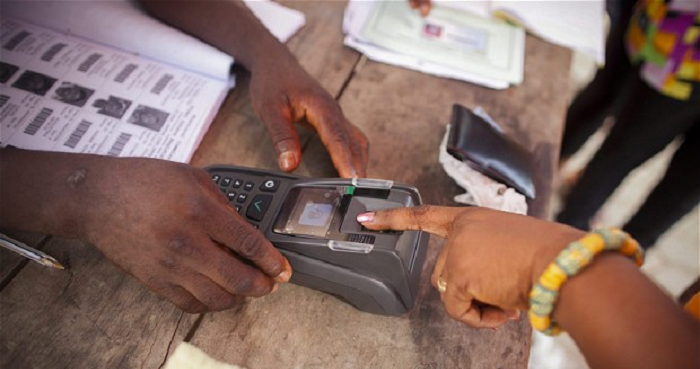
Voters rejected by verification machine can cast ballot
A new regulation that will allow voters to cast their ballots without biometric verification has been laid before Parliament.
Section 31(5) of the regulation, which is expected to be passed as a matter of course, states: " Where the biometric verification device fails to verify a voter, and the red light is shown with a voice message "rejected", the polling assistant shall inform the agents of political parties present at the polling station.
The polling assistant is required to present the voter who could not be verified by the machine with a form to fill stating that the voter tried to verify his or her identity but was rejected by the machine hence he or she would vote without that verification, after which the voter would be allowed to vote.
That is a marked departure from what pertained in 2012 when CI 75 which governed that election made it compulsory for anyone who sought to vote to be verified by the Biometric Verification Machine.
This led to the short and striking or memorable phrase : " No verification, no vote."
Two legislations
The new regulation is part of two pieces of legislation laid before Parliament to guide the conduct of the 2016 Parliamentary election.
They are the Public Elections Regulations (PER) 2016 and the Representation of the People (Parliamentary Constituencies) Instrument (PI).
They have both been referred to the Parliamentary Select Committee on Subsidiary Legislation for consideration and report.
The PER would revoke Constitutional Instrument CI 75 which governed the 2012 elections while the PI seeks to make changes to CI 71 which was used for this year's District Level Elections.
The Public Elections Regulations, 2016 would be in the House for 21 sitting days to mature to make it possible for it to be used for the elections.
After Parliament has approved the CI, it would be gazetted and given a name like all other CIs which have guided the conduct of elections in the past.
Approval and gazetting of the CI would render CI 75, which was used to conduct the 2012 elections, null and no longer of effect.
Implications of the PER
The new CI also has important effects on the 2016 elections. For example, if passed, the PER would indemnify all electoral or presiding officers from prosecution or any form of sanction for any blunders, mistakes, oversights or wrongdoing in the course of their work.
The mistakes and blunders committed by some presiding officers was brought to the fore during the 2012 election petition at the Supreme Court with some legal experts calling for the prosecution of the officers.
That suggestion was, however, rejected at the time.
It was suggested by the petitioners that the EC's presiding officers colluded with the governing National Democratic Congress (NDC) government to ensure that President John Mahama won the elections.
The new CI protects them against prosecution and, therefore, does not hold them liable for any blunder in the course of their work.
PI
The Representation of the People (Parliamentary Constituencies) Instrument, 2016, on the other hand, seeks to make changes to CI 71 which was used to conduct this year's district-level elections.
During the elections, some electoral areas and polling stations that were created were not backed by law.
The instrument gives them legality.
Non-availability of copies
After the Majority Leader, Mr Alban Bagbin, had laid the two pieces of legislation, the Member of Parliament for Tarkwa Nsuaem, Mrs Gifty Eugenia Kusi, drew the attention of the First Deputy Speaker, Mr Ebo Barton-Odro, to the fact that members of the House did not have copies of the new legislation.
It is required by the rules of the House that members be provided copies of bills, reports, and any other forms of legislation in the House before they are laid or discussed and that was what Mrs Kusi sought to draw the attention of the Deputy Speaker to.
After some back and forth arguments, the papers containing the legislation were laid with members still not provided copies and, therefore, not knowing the contents.
